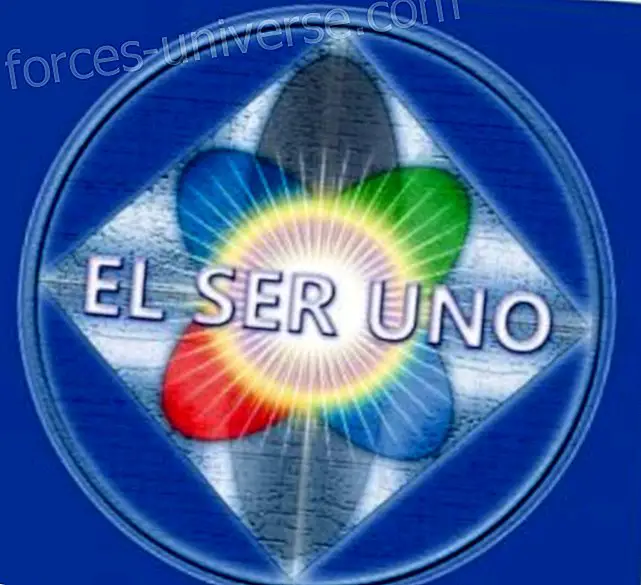Esotericism is a word that derives from Greek and means "from within, " "from within, " "intimate." Added to the suffix "ism" is a term that is used to refer to the set of doctrines, knowledge, practices and teachings of a current of thought that uses certain "secrets, " or symbols that are difficult to access. But let us know better what the nature of esotericism is, as well as its history and currents.
These "secrets" are transmitted exclusively to a selected minority of people who are called initiates.
The nature of esotericism, its deep reasons, seek to understand the world and man from the point of view of its internal causes. Exoteric knowledge, meanwhile, seeks the external effects and causes.
What is esotericism?
The fundamental difference between esoteric and exoteric knowledge is that the former needs some degree of initiation to study and understand it in depth, while exoteric knowledge is accessible to the common public and its transmission is freely possible.
Antoine Faivre, a French scholar, esoteric student and director of the Hermetic Library, points out, in his book "Spirituality of modern esoteric movements", that before the 19th century there was no term that integrated the different currents into one word. esoteric practices

The expression was only used as an adjective, in its interpretation of "inside-internal" and subsequently the word esotericism was coined to apply to the quality of esoteric.
History and nature of esotericism
In ancient times, many were the schools that cultivated at the same time a doctrine accessible to all and other hidden doctrines, which were reserved only for the initiated .
This knowledge was jealously guarded by certain priestly castes and within them, it was only a few who possessed total knowledge .
The transmission of all this knowledge, throughout the years and throughout history, has resulted in partial variations in the traditions, which have been founded in certain contexts detached from their primary purposes.
In ancient Greece, esoteric was one of the ways in which education was administered and was only dictated within certain schools. Teaching that was intended for the general public was taught outdoors.
The disciples that Pythagoras had, for example, were divided into exoteric and esoteric . The former were aspirants without clothing and the latter were fully initiated into the real doctrine of the teacher.
For Plato there were two philosophies: one that was accessible to all that was exposed in his Dialogues and another more technical, reserved exclusively for the initiated.
Aristotle separated his works into esoteric and exoteric . But this division was not determined by the issues themselves or their possible solutions, but exclusively in the forms and procedures of exposure.
The exoteric works expose the arguments in a clear and understandable way while the esoteric ones reserve those that are considered obscure and decisive.
René Guénon, a Masonic mathematician, philosopher and French esotericist (1886-1951), assured that all religions have an esoteric nucleus that, due to its high symbolic complexity, remains hidden for the great majority of believers. He said that the real meaning of religious rituals was only understood by the initiates.
The nature of esotericism and science
Modern science is defined as the set of knowledge obtained through observation, reasoning and experimentation based on a certain scientific method.
However, in ancient times, science, (from Latin, scientia = knowledge, knowing something), had a different meaning and also referred to esoteric knowledge . Parts of this esoteric knowledge were the product of a transcendental mind or intellectual intuition.

In his work The Crisis of the Modern World, Ren Gu non criticizes the modern sciences for despising esoteric knowledge . He assured that in this way he falls into a kind of shell or exoterism that is limited exclusively to the study of phenomena, ignoring the transcendent truth .
In his chapter IV he wrote: that is why the profane We have already said it elsewhere, as an knowledge ignorant, of a lower order, that everything remains whole at the lowest level of reality and the ignorant knowledge of everything that goes beyond it, ignorant of all ends .
Generally, for modern sciences the term esoteric has a pejorative character, but it should not be forgotten that some sciences developed from certain traditional
Chemistry owes much of its development to the practice of alchemy and astronomy was initially closely linked to astrology .
Piotr Deminovich Ouspensky, esotericist and Russian writer (1878-1947), classified the supernatural manifestations into magic and mysticism.
At the first the relationship with the action and the second with the feeling. Ouspensky compared the psychological method with the esoteric method in the acquisition of knowledge. He considered that the psychological mind can see the limitations of the logical mind, since it is able to distinguish between different levels of thinking and understand the fact that perceptions change according to the faculties and properties of the percipient.
The different currents of the nature of esotericism
There are numerous spiritual expressions that can be included in esotericism due to their characteristics.
Ou douard Schure, writer and French esoteric musician, (1841-1929), in his work The Great Initiates, identifies two major currents from which all the mythologies and religions, arts, sciences and philosophies of history would derive: Semitic and Aryan currents .
The first would be originated by Moses in Egypt and the second, Rama in India.
It is possible to identify numerous types of esotericism depending on the current or the ideology that is practiced. In this way you can determine the most important:
- Masonic Esotericism
- Egyptian Esotericism
- Maya esotericism
- Christian esotericism
In turn, it is possible to make another division between Western and Eastern currents:
- Oriental esoteric currents : Kabbalah, Sufism, Tantra, Taoism, Vajrayàna, Yoga.
- Western esoteric currents : Alchemy, Anthroposophy, Freemasonry, Gnosticism, Hermeticism, Orphism, Pythagoreanism, Rosicrucianism, Theosophy, Thelema.
Popular culture and the nature of esotericism
Esotericism has become a characteristic element of mass culture, as interest in secret societies and esoteric traditions has increased since the late nineteenth century.
Astrology, geomancy, magic and tarot are esoteric elements in their origin, which have been popularized, marketed and incorporated into western daily life.
The scientific community and the Church in particular, have described as “supermarket of the new era” certain social centers that practice esotericism, since they understand that they have become a fashion, with methods of selling merchandise.
It is possible to find, they say, all kinds of trends: I Ching, incenses, candles, perfumes and images of Buddha or Christ. Prayer books, mantras, mandalas and countless natural and vegetarian recipes.
Audiovisual products that include messages and healing classes with their subsequent release. Books, psychotherapies and hypnosis of various origins.
There are exercises to know karma and past lives, or to have contact with angels and their orders and messages. There are all kinds of attractive and very striking objects among the common consumer items.
Some of the occult symbols receive wide acceptance among the esoteric believers . Thus we find the most popular as the star of David, the Tetragramton, the Rosicrucian, the Square and the Compass or the Esoteric Pentagram.
Seen in Lucistrust, by Pedro, editor of the White Brotherhood
https://www.lucistrust.org/es/ arcane_school / talks_and_ articles / the_nature_ esotericism






